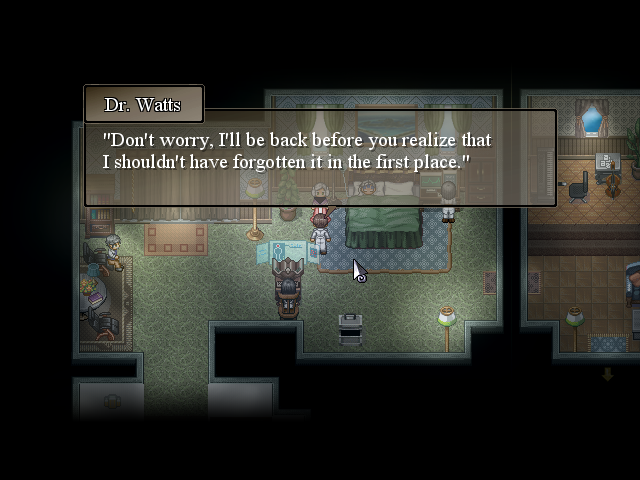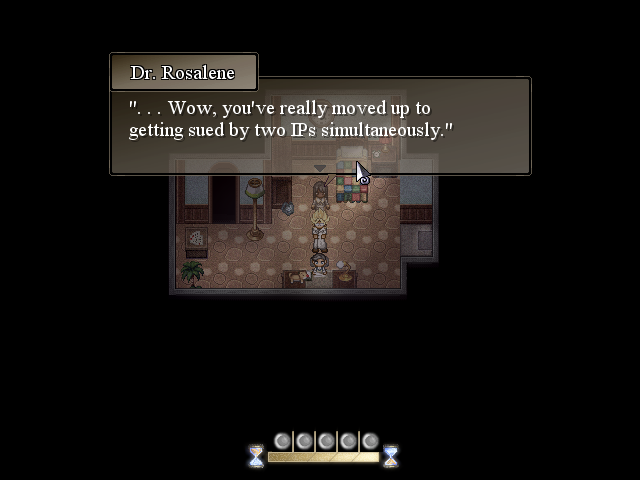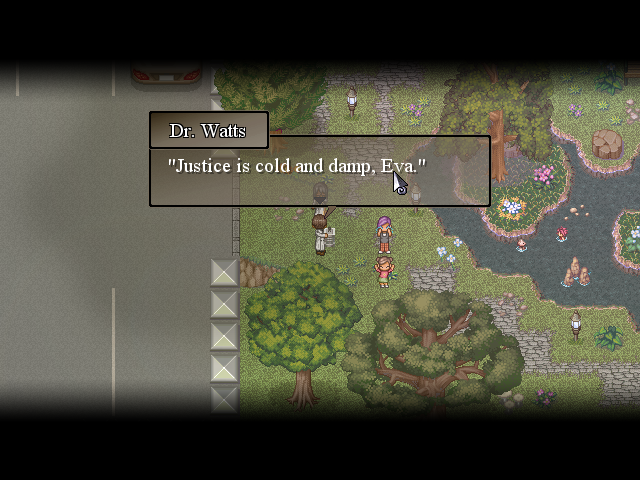While playing Finding Paradise for review, I was taken aback on more than one occasion by how much humor was in the game. Having not yet played the game’s prequel, To the Moon, I was not prepared for comedy of any sort. I was prepared for a game about death.
The Sad Part
Throughout my first couple hours in the game, I couldn’t help but wonder what conversations went on behind the scenes at Freebird Games that would possess writer Kan Gao to develop characters who presented so much dissonance to the greater tone of the game’s story. The word “crass” came to mind several times.

You see, Finding Paradise’s story is not a funny one, by any means. A man named Colin Reeds is dying, and main characters Dr. Neil Watts and Dr. Eva Rosalene show up to hack into his mind and manipulate his memories (in accordance with the secret wishes Reeds, himself, submitted to their employer, Sigmund Corp.). That is, they are in his home and his head to give him the illusion of the fulfillment he spent his entire adult life seemingly unable to obtain.
This whole diving-into-his-head scenario, I should add, takes place in the company of his wife and son, both of whom are hurt and confused, wondering if perhaps he has wished to have them deleted from his memory.
The Funny Part
The story definitely packs a punch, full of surprise and beauty and the shapeless melancholy of encroaching death. Yet, throughout the five to six hours it takes to tell the story of Finding Paradise, the two doctors are constantly dropping jokes and casting side-glances past the fourth wall. Watts’ demeanor is naturally quirky and unfiltered, often setting up Rosalene for responses that play out like indirect meta jokes, like Gao writing about the game from within the game.
At one point, for example, while attempting to break a shield around an object within the reality-bending world of their patient’s memory, Watts goes Super Saiyan, channeling his inner Goku. His aura radiates, his hair turns skyward and blonde. As he does this, he shouts “Hadouken!” and unleashes a powerful attack on the unsuspecting shield. This is Rosalene’s response:
 Despite how out of place these jokes feel in the opening act of the game, by the end it is clear that the humor in Finding Paradise flat out works. It doesn’t just break the tension, but somehow manages to increase the impact of the story, tugging you in the opposite direction like some kind of narrative emotional slingshot before launching you to the moon in the story’s climactic moments.
Despite how out of place these jokes feel in the opening act of the game, by the end it is clear that the humor in Finding Paradise flat out works. It doesn’t just break the tension, but somehow manages to increase the impact of the story, tugging you in the opposite direction like some kind of narrative emotional slingshot before launching you to the moon in the story’s climactic moments.
There is, as it turns out, a good reason for this. As John Morreall, founder of the International Society for Humor Studies, once wrote, “humor today goes hand in hand with our rationality, and not just rationality in the sense of cognitive sophistication, but also in the sense of a rational attitude toward the world. Part of this attitude is viewing things critically, and people with a well-developed sense of humor naturally look at things critically, because they are looking for incongruity.”
How Humor Binds the Story Together
What we can take from Morreall’s observations is that Watts’ and Rosalene’s humorous banter works precisely because it is so jarring. Their humor endears us to them and exposes the mechanisms within them which allow the two doctors to function logically in a simulated world of incongruous memory and emotion. They are wired to be funny as a result of the characteristics which put them in that position in the first place.

The humor extends beyond the doctors, though. It is more than a slingshot. It’s the thread that stitches the game’s memory world to the real world.
Finding Paradise can be boiled down into a set of conflicting ideals: The science of Sigmund Corp. and the tension of a distraught family; the shifting, dreamy realm of memory and the critical precision of Watts and Rosalene; beautiful memories amid the quiet sorrow of a life now almost entirely past-tense.
Humor, then, is an integral part of the story of Finding Paradise and the To the Moon series of which it is part. It seems that Dr. Rosalene and Dr. Watts are the right team for the job. Their senses of humor are the ideal complement to a moving tale of coming to terms with legacy of one’s own life.



